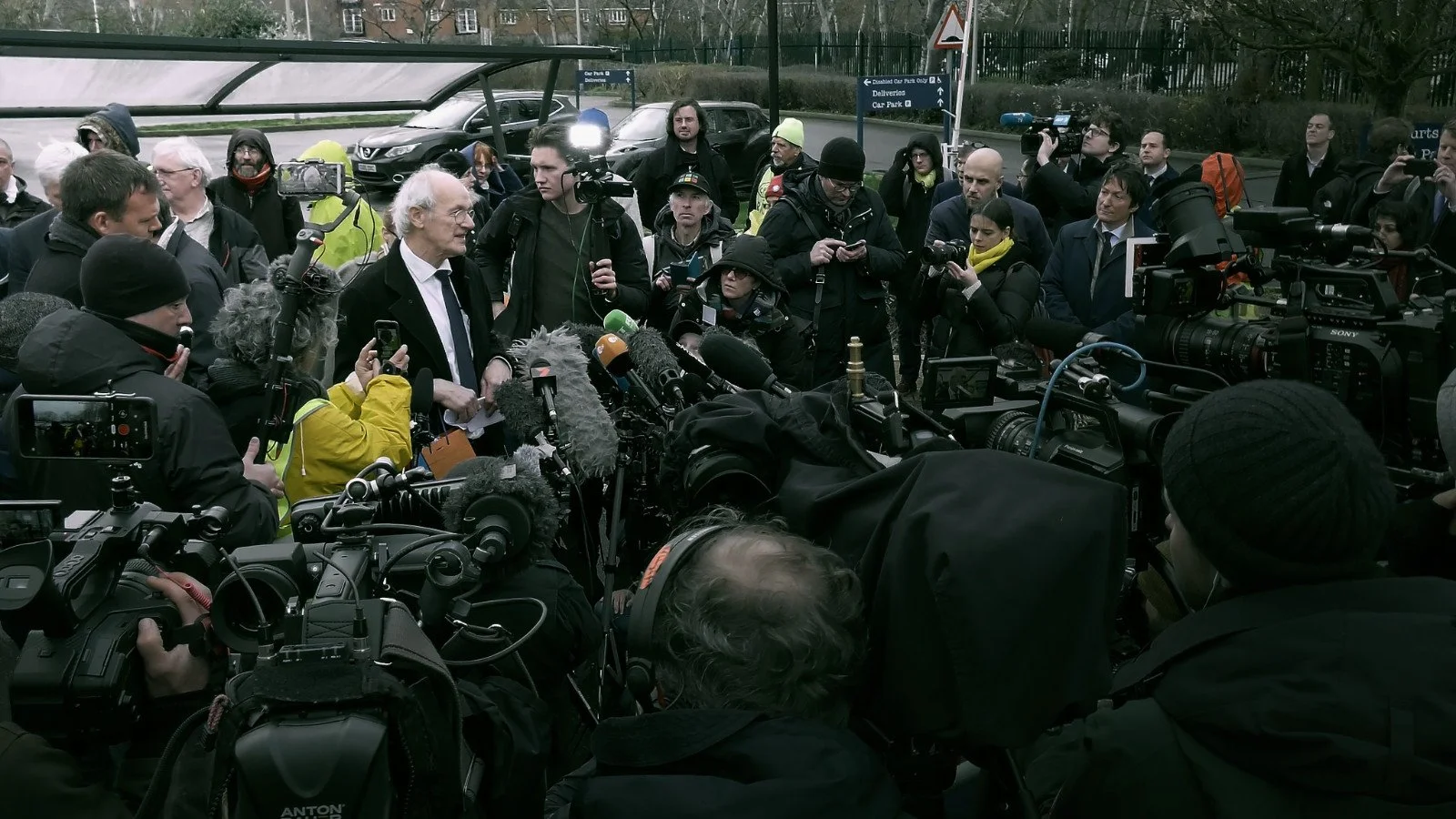Ithaka: Family-Led Portrait of Julian Assange Flies the Flag for Sympathy and Freedom
By Liam Lacey
Rating: B-
Whether he’s a martyred hero or reckless megalomaniac, Wikileaks founder Julian Assange is a complicated figure whose exploits and ongoing incarceration raise challenging questions about the role of journalism and whistleblowers in the 21st century.
You won’t find much ambiguity on these subjects in the documentary Ithaka, directed by Ben Lawrence and produced by Assange’s half-brother, Gabriel Shipton. Unsurprisingly, it’s totally Team Julian.
The film tracks the crusade by Assange’s spouse, Stella Moris Assange — a human rights lawyer and the mother of his two young children — along with the prisoner’s 76-year-old father, John Shipton, as they work to free Assange from Britain’s maximum security Belmarsh prison, and prevent his extradition to the United States.
The title Ithaka grandly evokes the bond between the Homeric hero, Odysseus and his estranged son, Telemachus, who unite to battle the abusers of their estate. Certainly, Assange’s trials over the past 13 years are worthy of an epic.
The furies that torment him are U.S. government officials, who have pursued criminal charges against Assange since the 2010. That’s when Wikileaks obtained almost 750,000 military and diplomatic files, leaked by intelligence analyst Chelsea Manning. In partnership with the New York Times, The Guardian, and Der Spiegel, Wikileaks published exposés of human rights abuses and war crimes by the Americans in Iraq and Afghanistan.
In that same year, Assange faced extradition to Sweden on allegations of sexually assaulting two women, which he claimed was part of a plot to extradite him the United States. In 2012, he took refuge in the Ecuadorian embassy in London where he was granted asylum until 2019, after which he was sentenced to Belmarsh for breaching his bail.
Subsequently, the U.S. government unsealed indictments charging him with computer hacking and violating the Espionage Act, requesting that he be extradited to the United States where he could face 175 years in prison.
The movie ends in early 2021, after Assange was granted a reprieve because of the decline of his physical and mental health and risk of suicide. That decision was reversed on appeal in late 2022, and now, barring a successful appeal, Assange faces extradition.
The central question is whether Assange is being prosecuted for stealing state secrets or, as his supporters in the film contend, for publishing those secrets. Organizations including Amnesty International and the American Civil Liberties Union regard Assange as a political prisoner and view his prosecution as a dangerous precedent for convicting future whistleblowers and investigative journalists.
For his spouse Stella Moris Assange, who met Assange when she joined his legal team, it’s a straight-forward free speech issue: “What Julian stands for goes to the very heart of what it means to live in a democracy.”
In this view, critics in the media, in turning against Assange, have “bought the narrative” as podcast host Joe Rogen puts it in the film, that Assange is now a bad faith actor. Assange’s father, John Shipton, grumbles that “the mass media serves only power and money, really. If they drift from that, they will no longer exist.”
Shipton grits his teeth and subjects himself to interviews, including with the film crew, for his son’s sake. He emerges as the irritable star of the film (his son Assange is barely seen, and heard from a couple of times on the phone).
Tall, professorial, with a mane of white hair, Shipton gives the impression that the apple didn’t fall from the tree, though he was absent from his Julian’s life from the age of three until his early twenties.
Shipton arrived from Melbourne at the start of his son’s incarceration, and, through the subsequent months, we watch him work to drum up support for him, despite his adversity to the press. He bristles at what he considers invasions of his privacy but becomes loquacious when talking about himself, his youthful depression, his “Aspergic” disposition and his struggle to understand love and other social interactions. He has a five-year-old daughter back in Australia, who he clearly adores and calls from time to time. How did that happen? (Forget it, it’s private.)
As sympathetic and authentic as John and Stella come across, the Assange devotees’ reflexive rejection of criticism of Assange’s judgement and actions begins to feel cultish. There are plenty of reasons why liberal media turned on Assange a half-dozen years ago that can’t be blamed on government spin.
Those include Wikileaks’ interference in the 2016 elections by releasing emails stolen from the Democratic National Party, allegedly obtained by Russian hackers, and welcomed by Donald Trump, and Assange’s promotion of the false conspiracy theory linking DNC employee Seth Rich to the leaked emails. Laura Poitras’ film, Risk (2016) chronicled her disillusionment with Assange’s increasingly obvious arrogance and misogyny.
Of course, the fact that Assange doesn’t check all the Nelson Mandala hero boxes doesn’t justify his life-long incarceration. But no one should be surprised that the U.S. government still considers him a threat, or that, if liberated, he won’t strike again.
Ithaka. Written and directed by Ben Lawrence. Screening at the Ted Rogers Hot Docs Cinema through to March 26. A Q&A with Julian Assange’s half-brother, film producer Gabriel Shipton and his father John Shipton, follows the March 24 screening.



